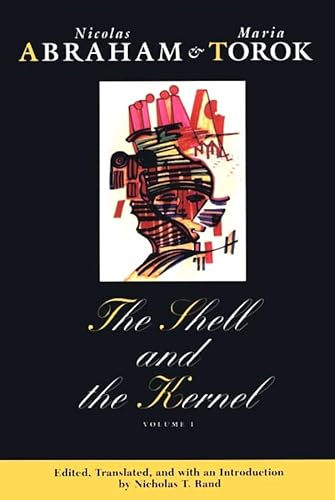Articles liés à The Shell and the Kernel: Renewals of Psychoanalysis

L'édition de cet ISBN n'est malheureusement plus disponible.
Synopsis
This volume is a superb introduction to the richness and originality of Abraham and Torok's approach to psychoanalysis and their psychoanalytic approach to literature. Abraham and Torok advocate a form of psychoanalysis that insists on the particularity of any individual's life story, the specificity of texts, and the singularity of historical situations. In what is both a critique and an extension of Freud, they develop interpretive strategies with powerful implications for clinicians, literary theorists, feminists, philosophers, and all others interested in the uses and limits of psychoanalysis.
Central to their approach is a general theory of psychic concealment, a poetics of hiding. Whether in a clinical setting or a literary text, they search out the unspeakable secret as a symptom of devastating trauma revealed only in linguistic or behavioral encodings. Their view of trauma provides the linchpin for new psychic and linguistic structures such as the "transgenerational phantom," an undisclosed family secret handed down to an unwitting descendant, and the intra-psychic secret or "crypt," which entombs an unspeakable but consummated desire. Throughout, Abraham and Torok seek to restore communication with those intimate recesses of the mind which are, for one reason or another, denied expression. Classics of French theory and practice, the essays in volume one include four previously uncollected works by Maria Torok. Nicholas Rand supplies a substantial introductory essay and commentary throughout. Abraham and Torok's theories of fractured meaning and their search for coherence in the face of discontinuity and disruption have the potential to reshape not only psychoanalysis but all disciplines concerned with issues of textual, oral, or visual interpretation.Les informations fournies dans la section « Synopsis » peuvent faire référence à une autre édition de ce titre.
Présentation de l'éditeur
This volume is a superb introduction to the richness and originality of Abraham and Torok's approach to psychoanalysis and their psychoanalytic approach to literature. Abraham and Torok advocate a form of psychoanalysis that insists on the particularity of any individual's life story, the specificity of texts, and the singularity of historical situations. In what is both a critique and an extension of Freud, they develop interpretive strategies with powerful implications for clinicians, literary theorists, feminists, philosophers, and all others interested in the uses and limits of psychoanalysis. Central to their approach is a general theory of psychic concealment, a poetics of hiding. Whether in a clinical setting or a literary text, they search out the unspeakable secret as a symptom of devastating trauma revealed only in linguistic or behavioral encodings. Their view of trauma provides the linchpin for new psychic and linguistic structures such as the "transgenerational phantom" an undisclosed family secret handed down to an unwitting descendant, and the intra-psychic secret or "crypt" which entombs an unspeakable but consummated desire. Throughout, Abraham and Torok seek to restore communication with those intimate recesses of the mind which are, for one reason or another, denied expression. Classics of French theory and practice, the essays in volume one include four previously uncollected works by Maria Torok. Nicholas Rand supplies a substantial introductory essay and commentary throughout. Abraham and Torok's theories of fractured meaning and their search for coherence in the face of discontinuity and disruption have the potential to reshape not only psychoanalysis but all disciplines concerned with issues of textual, oral, or visual interpretation.
Les informations fournies dans la section « A propos du livre » peuvent faire référence à une autre édition de ce titre.
(Aucun exemplaire disponible)
Chercher: Créez une demandeVous ne trouvez pas le livre que vous recherchez ? Nous allons poursuivre vos recherches. Si l'un de nos libraires l'ajoute aux offres sur AbeBooks, nous vous le ferons savoir !
Créez une demande
